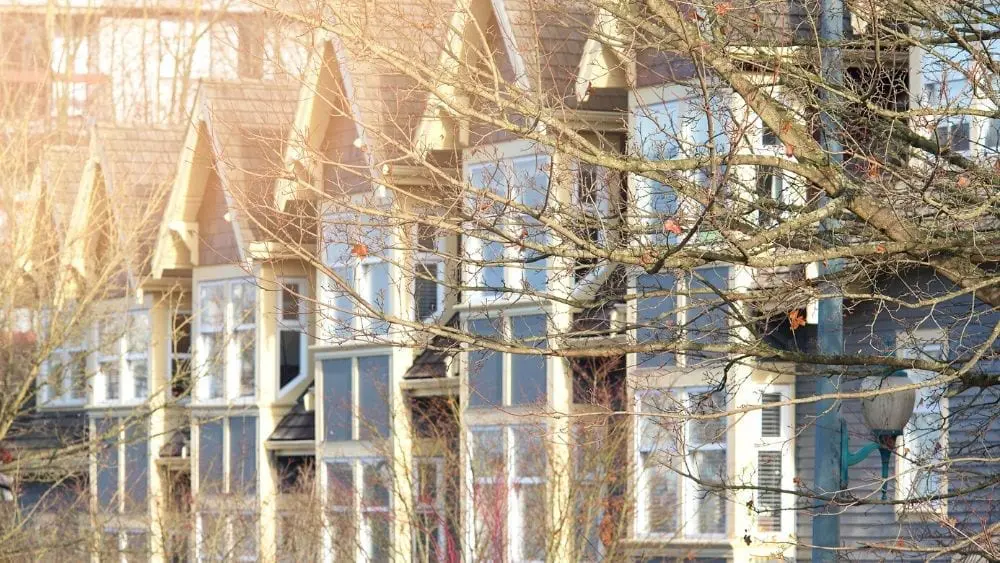
Over the past year, more millennials have entered the housing market as first time homebuyers than any other demographic. Because this generation tends to prefer active urban living, and prioritizes luxury fixtures over square footage, townhomes and condos seem like natural, logical options for an affordable first home.
Condos and townhomes (difference between these two vary by definition, but they generally mean the same thing) offer first-time homebuyers an affordable way to invest in homeownership, especially in vibrant urban environments.
However, you’re a young, first-time homebuyer, so before you call your agent and tell them you never want to tour a single-family home again, review all the pros and cons of buying a condo or townhouse as your first home.
Pros of Buying a Townhome as a First-Time Homebuyer
- Great locations and easy access to urban living
- More affordable prices
- Lower renovation costs
- Lower utility bills and insurance costs
- Low maintenance living and shared amenities
- A strong sense of community
- Safer living environment
- More freedom, plus equity
Condos and townhomes have many benefits for first time homebuyers, including great locations and more affordable pricing. According to Sarah Boggs, a realtor selling condos in downtown Miami, condos and townhomes in urban nerve centers are in demand with home shoppers because of, “The proximity of work and fun as well as amazing views and amenities in the buildings.” For home shoppers looking to buy their first home in a hot real estate market, condos and townhomes can help them save money. Phil Evans, buyer specialist with Keller Williams Realty, found that in San Francisco, condos cost on average $100,000 less than single-family homes.
There are ongoing financial advantages associated with these housing options, too. Cost-conscious first-time homebuyers can save money while living in a condo or townhome when comparing the costs living in a single-family home. A combination of shared renovation and maintenance cost with lower utility bills make life in a condo or townhome easy and affordable for buyers who do not want – or financially can’t – shoulder the full burden of managing the upkeep associated with a single-family home.
With condos and townhomes, a homeowner’s association, or HOA, is financially responsible for repairs and upkeep. HOA fees may additionally cover city services, lawn care, pest control, and insurance. The simplicity and ease the this maintenance model provides can be great for first-time buyers and retirees. Along with peace of mind when it comes to emergency repairs and ongoing maintenance, buying a condo or townhome alleviates the burden of yard work and landscaping. You also won’t have to worry about snow removal or cleaning the pool.
The purchase of a new townhome or a condo could mean access to extra amenities. Oftentimes these communities will have a swimming pool, spa, fitness center, covered parking, common areas, and gated security. For many younger buyers, these features would be unattainable when buying a single-family home. Retired empty nesters may also love being able enjoy the maintenance-free pool with their grandchildren.
“There is also a sense of community present in condo communities that is not always present in other communities,” says Rodney Fentress, a real estate professional at Keller Williams. These communities have intangible benefits in addition to the money they save homebuyers. Townhomes foster a close-knit sense of belonging and safety thanks to shared amenities — and the idea that your neighbors are your friends who have your back when you go on vacation.
“Everyone likes privacy, but most want to feel like they are close to help, action (the buzz of downtowns), and work. Condos often provide this feeling,” says Evans. Buying a condo or townhome as your first home allows you to live in your ideal location while saving money and becoming part of a secure, caring community.
Owning a condo is very similar to renting an apartment, except that the owner has the freedom to modify their unit as much as they like, as long as it’s within the written standards set forth by the community. Unlike renting, however, the buyer builds equity with their investment. This equity comes in handy when it’s time to purchase a larger home in the future. Therefore, it makes a great stopgap solution for the first-time homebuyer who is still preparing for the added costs and responsibilities of a single-family home.
Cons of Buying a Townhome as a First-Time Homebuyer
- Home shoppers often need higher down payments
- VA and FHA loans are not generally available to home shoppers interested in townhomes
- Units do not appreciate as quickly and lose value when markets shift
- Must account for homeowner associations and fees
- Additional maintenance fees
- Shared walls
Just like any type of house, condos and townhomes are not always the best home plans for all homebuyers. “Many people don’t realize that financing is more difficult when you purchase a condo and the buyer typically needs a larger down payment,” says Boggs.
While condos and townhomes cost less overall than a traditional single-family home, home shoppers typically need higher down payments to get loans these smaller homes, and generally cannot apply VA or FHA loans to these types of homes. If you are thinking about buying a condo or townhome as your first home, there are still assistance programs available to first-time homebuyers, but be ready to navigate a more complex financing process and save for the higher down payment.
First-time homebuyers should pay attention to the difference in appreciation rates between townhomes and single-family homes, too. Townhomes and condo units do not appreciate as fast as single-family homes, and can lose value faster when the housing market value shift downward. Take some time to understand your real estate market before investing in a new condo or townhome, especially if you plan on selling the house in a few years.
Owning a condo or townhome can cut maintenance and utility bill costs, but first-time homebuyers must account for condo and townhome association fees when calculating their monthly bills. In addition to monthly HOA dues, which go toward maintaining the building, grounds, and amenities, residents sometimes have to pay special assessment fees for unexpected costs, like roof repair. When deciding on what you can afford in a condo or townhome, factor in HOA dues and give yourself some wiggle-room in your budget for special assessment fees.
Most of the cons of buying a condo or townhome as a first-time homebuyer stem from a financial system that can have more layers than what’s associated with buying a single-family home. There can also be some issues with sharing walls with neighbors. Thankfully, most new townhomes are built so owners don’t have to worry about overhearing their neighbors.
Home shopping as a first-time homebuyer can seem difficult, but deciding if you want to live in a new townhome can make your home search easier by narrowing down the available housing market options. As you shop for your first home, keep your needs and lifestyle in mind before deciding to invest in a townhome, condo or a single-family home.
If you are looking to buy your first new home, let us know if you would buy a condo or townhome, and why or why not, in the comments below.

After graduating in 2016 from The University of Texas with a degree in English, Sanda Brown became a content writer for the BDX with a focus on website copy and content marketing.
At the BDX, Sanda helps write and edit articles on NewHomeSource.com, writes website copy for builders, and manages a team of freelancers that work on additional content needs.
 Homebuying Checklist for the First-Time Homebuyer
Homebuying Checklist for the First-Time Homebuyer